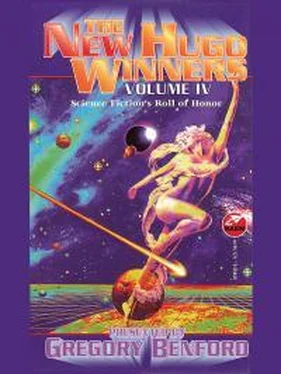Грегори Бенфорд - The New Hugo Winners - Volume IV
Здесь есть возможность читать онлайн «Грегори Бенфорд - The New Hugo Winners - Volume IV» весь текст электронной книги совершенно бесплатно (целиком полную версию без сокращений). В некоторых случаях можно слушать аудио, скачать через торрент в формате fb2 и присутствует краткое содержание. Год выпуска: 1997, ISBN: 1997, Издательство: Baen, Жанр: Фантастика и фэнтези, на английском языке. Описание произведения, (предисловие) а так же отзывы посетителей доступны на портале библиотеки ЛибКат.
- Название:The New Hugo Winners - Volume IV
- Автор:
- Издательство:Baen
- Жанр:
- Год:1997
- ISBN:0-671-87852-2
- Рейтинг книги:5 / 5. Голосов: 1
-
Избранное:Добавить в избранное
- Отзывы:
-
Ваша оценка:
- 100
- 1
- 2
- 3
- 4
- 5
The New Hugo Winners - Volume IV: краткое содержание, описание и аннотация
Предлагаем к чтению аннотацию, описание, краткое содержание или предисловие (зависит от того, что написал сам автор книги «The New Hugo Winners - Volume IV»). Если вы не нашли необходимую информацию о книге — напишите в комментариях, мы постараемся отыскать её.
The New Hugo Winners - Volume IV — читать онлайн бесплатно полную книгу (весь текст) целиком
Ниже представлен текст книги, разбитый по страницам. Система сохранения места последней прочитанной страницы, позволяет с удобством читать онлайн бесплатно книгу «The New Hugo Winners - Volume IV», без необходимости каждый раз заново искать на чём Вы остановились. Поставьте закладку, и сможете в любой момент перейти на страницу, на которой закончили чтение.
Интервал:
Закладка:
I recall my last conversation with him, only months before he died. His prodigious memory had failed and he could again read favorite mysteries, not knowing how they would turn out. An oblique blessing indeed. He told me how his memory once had organized each scrap of new information, filing it properly under instinctive headings for instant recovery. "It saved time looking things up," he said. I once tested this filing system by demanding that he immediately tell me a joke with a camel in it. Without blinking, he did. Okay, I said, now another. He delivered just as quickly. I wondered how many more camel jokes he had and he shot back, "Three."
His books were filled with such almost offhand intelligence and knowledge. Readers flocked to them. Such is the continuing impact of probably the most influential sf novelist since Wells. For a memorable lingering moment with him, "Gold" give us Isaac still at his peak.
Jonas Willard looked from side to side and tapped his baton on the stand before him.
He said, "Understood now? This is just a practice scene, designed to find out if we know what we're doing. We've gone through this enough times so that I expect a professional performance now. Get ready. All of you get ready."
He looked again from side to side. There was a person at each of the voice-recorders, and there were three others working the image projection. A seventh was for the music and an eighth for the all-important background. Others waited to one side for their turn.
Willard said, "All right now. Remember this old man has spent his entire adult life as a tyrant. He is accustomed to having everyone jump at his slightest word, to having everyone tremble at his frown. That is all gone now but he doesn't know it. He faces his daughter whom he thinks of only as a bent-headed obsequious girl who will do anything he says, and he cannot believe that it is an imperious queen that he now faces. So let's have the King."
Lear appeared. Tall, white hair and beard, somewhat disheveled, eyes sharp and piercing.
Willard said, "Not bent. Not bent. He's eighty years old but he doesn't think of himself as old. Not now. Straight. Every inch a king." The image was adjusted. "That's right. And the voice has to be strong. No quavering. Not now. Right?"
"Right, chief," said the Lear voice-recorder, nodding.
"All right. The Queen."
And there she was, almost as tall as Lear, standing straight and rigid as a statue, her draped clothing in fine array, nothing out of place. Her beauty was as cold and unforgiving as ice.
"And the Fool."
A little fellow, thin and fragile, like a frightened teenager but with a face too old for a teenager and with a sharp look in eyes that seemed so large that they threatened to devour his face.
"Good," said Willard. "Be ready for Albany. He comes in pretty soon. Begin the scene." He tapped the podium again, took a quick glance at the marked-up play before him and said, "Lear!" and his baton pointed to the Lear voice-recorder, moving gently to mark the speech cadence that he wanted created.
Lear says, "How now, daughter? What makes that frontlet on? Methinks you are too much o' late i' th' frown."
The Fool's thin voice, fifelike, piping, interrupts, "Thou wast a pretty fellow when thou hadst no need to care for her frowning—"
Goneril, the Queen, turns slowly to face the Clown as he speaks, her eyes turning momentarily into balls of lurid light—doing it so momentarily that those watching caught the impression rather than viewed the fact. The Fool completes his speech in gathering fright and backs his way behind Lear in a blind search for protection against the searing glance.
Goneril proceeds to tell Lear the facts of life and there is the faint crackling of thin ice as she speaks, while the music plays in soft discords, barely heard.
Nor are Goneril's demands so out of line, for she wants an orderly court and there couldn't be one as long as Lear still thought of himself as tyrant. But Lear is in no mood to recognize reason. He breaks into a passion and begins railing.
Albany enters. He is Goneril's consort—round-faced, innocent, eyes looking about in wonder. What is happening? He is completely drowned out by his dominating wife and by his raging father-in-law. It is at this point that Lear breaks into one of the great piercing denunciations in all of literature. He is overreacting. Goneril has not as yet done anything to deserve this, but Lear knows no restraint. He says:
"Hear, Nature, hear dear goddess, hear!
Suspend thy purpose, if thou didst intend
To make this creature fruitful.
Into her womb convey sterility;
Dry up in her the organs of increase;
And from her derogate body never spring
A babe to honour her! If she must teem,
Create her child of spleen, that it may live
And be a thwart disnatur'd torment to her.
Let it stamp wrinkles in her brow of youth,
With cadent tears fret channels in her cheeks,
Turn all her mother's pains and benefits
To laughter and contempt, that she may feel
How sharper than a serpent's tooth, it is
To have a thankless child!"
The voice-recorder strengthened Lear's voice for this speech, gave it a distant hiss, his body became taller and somehow less substantial as though it had been converted into a vengeful Fury.
As for Goneril, she remained untouched throughout, never flinching, never receding, but her beautiful face, without any change that could be described, seemed to accumulate evil so that by the end of Lear's curse, she had the appearance of an archangel still, but an archangel ruined. All possible pity had been wiped out of the countenance, leaving behind only a devil's dangerous magnificence.
The Fool remained behind Lear throughout, shuddering. Albany was the very epitome of confusion, asking useless questions, seeming to want to step between the two antagonists and clearly afraid to do so.
Willard tapped his baton and said, "All right. It's been recorded and I want you all to watch the scene." He lifted his baton high and the synthesizer at the rear of the set began what could only be called the instant replay.
It was watched in silence, and Willard said, "It was good, but I think you'll grant it was not good enough. I'm going to ask you all to listen to me, so that I can explain what we're trying to do. Computerized theater is not new, as you all know. Voices and images have been built up to beyond what human beings can do. You don't have to break your speechifying in order to breathe; the range and quality of the voices are almost limitless; and the images can change to suit the words and action. Still, the technique has only been used, so far, for childish purposes. What we intend now is to make the first serious compu-drama the world has ever seen, and nothing will do—for me, at any rate—but to start at the top. I want to do the greatest play written by the greatest playwright in history: King Lear by William Shakespeare.
"I want not a word changed. I want not a word left out. I don't want to modernize the play. I don't want to remove the archaisms, because the play, as written, has its glorious music and any change will diminish it. But in that case, how do we have it reach the general public? I don't mean the students, I don't mean the intellectuals, I mean everybody. I mean people who've never watched Shakespeare before and whose idea of a good play is a slapstick musical. This play is archaic in spots, and people don't talk in iambic pentameter. They are not even accustomed to hearing it on the stage.
"So we're going to have to translate the archaic and the unusual. The voices, more than human, will, just by their timbre and changes, interpret the words. The images will shift to reinforce the words.
Читать дальшеИнтервал:
Закладка:
Похожие книги на «The New Hugo Winners - Volume IV»
Представляем Вашему вниманию похожие книги на «The New Hugo Winners - Volume IV» списком для выбора. Мы отобрали схожую по названию и смыслу литературу в надежде предоставить читателям больше вариантов отыскать новые, интересные, ещё непрочитанные произведения.
Обсуждение, отзывы о книге «The New Hugo Winners - Volume IV» и просто собственные мнения читателей. Оставьте ваши комментарии, напишите, что Вы думаете о произведении, его смысле или главных героях. Укажите что конкретно понравилось, а что нет, и почему Вы так считаете.








